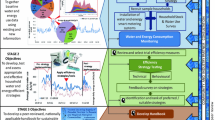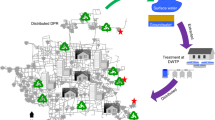Abstract
Distributed water infrastructure (located at the community or the household level) is relatively untried and unproven, compared with technologies for managing urban water at higher (e.g. regional) levels. This work presents a review of currently available options for distributed water infrastructure and illustrates the potential impact of their deployment through a number of indicative infrastructure strategies. The paper summarises the main categories of both centralised and decentralised water infrastructure, covering all three flows (water supply, wastewater and drainage) and their integration through recycling and reuse. The potential impact of the identified infrastructure options for urban water management is examined. The desirability of the strategies examined, is dependent on (case specific) constraints to urban development, including for example regional or local water resource availability, treatment plant capacity, cost of upgrading infrastructure, potential for (distributed) energy (micro) generation and climatic changes (and other non-stationary processes). The results are presented and discussed. It is concluded that there is currently a significant potential for a range of improvements in urban water management which could result from the context-aware deployment of a portfolio of technological infrastructure options. It is also suggested that there are trade-offs between water use, energy use and land use, and these have an equilibrium point that is associated with the technological state-of-art. At a given technological state-of-art, further reductions in water savings signify increase either energy consumption (for high-tech solutions) or land use (for low-tech solutions). The strategies’ evaluation indicates however, that until this equilibrium point is reached there can be significant gains in all three aspects. After this equilibrium, improvements in one aspect inevitably signify costs in others. The choice of desired trade-off then depends on the specific constraints of the problem at hand.
Similar content being viewed by others
References
Alanne K, Saari A (2006) Distributed energy generation and sustainable development. Renew Sustain Energy Rev 10:539–558
Ashok S (2007) Optimised model for community-based hybrid energy system. Renew Energy 32:1155–1164
Balkema AJ (2003) Sustainable wastewater treatment: developing a methodology and selecting promising systems. Technische Universiteit Eindhoven, Eindhoven
Berndtsson J (2006) Experiences from the implementation of a urine separation system: goals, planning, reality. Build Environ 41(4):427–437
Brown RR, Farrelly MA (2009) Delivering sustainable urban water management: a review of the hurdles we face. Water Sci Technol 59(5):839–846
Butler D, Davies J (2000) Urban drainage. Spon, London
Butler D, Makropoulos C (2006) Water related infrastructure for sustainable communities. Technological options and scenarios for infrastructure systems. Science Report SC05002501, Environment Agency, ISBN: 184432611X, 125 pp. Available at http://publications.environment-agency.gov.uk
Butler D, Kokkalidou A, Makropoulos C (2005) Supporting the siting of new urban developments using sustainability criteria. In: Hlavinek P, Kukharchyk T (eds) Integrated urban water resources management. Kluwer Academic, The Netherlands
Cherni JA, Dyner I, Henao F, Jaramillo P, Smith R, Font RO (2007) Energy supply for sustainable rural livelihoods. A multi-criteria decision-support system. Energy Policy 35:1493–1504
Chu J, Wang C, Chen J, Wang H (2009) Agent-based residentialwater use behavior simulation and policy implications: a case-study in Beijing City. Water Resour Manag 23(15):3267–3295
Cowden JR, Watkins DW, Mihelcic JR (2008) Stochastic rainfall modeling in West Africa: parsimonious approaches for domestic rainwater harvesting assessment. J Hydrol 361(1–2):64–77
Davies JW, Le MS, Heath CR (1998) Intensified activated sludge process with submerged membrane microfiltration. Water Sci Technol 38(45):421–428
Evan DGF, Dougill AJ, Mabee WE, Reed M, McAlpine P (2006) Bottom up and top down: analysis of participatory processes for sustainability indicator identification as a pathway to community empowerment and sustainable environmental management. J Environ Manag 78(2):114–127
Folke C, Hahn T, Olsson P, Norberg J (2005) Adaptive governance of social–ecological systems. Annu Rev Environ Resour 30:441–473
Frazer-Williams R, Avery L, Winward G, Jeffrey P, Shirley-Smith C, Liu S, Memon F, Jefferson B (2008) Constructed wetlands for urban grey water recycling. Int J Environ Pollut 33(1):93–109
Friedler E, Hadari M (2006) Economic feasibility of greywater reuse in multi-storey buildings. Desalination 190:221–234
Jaramillo OA, Borja MA, Huacuz JM (2004) Using hydropower to complement wind energy: a hybrid system to provide firm power. Renew Energy 29:1887–1909
Koutsoyiannis D, Makropoulos C, Langousis A, Baki S, Efstratiadis A, Christofides A, Karavokiros G, Mamassis N (2009) Climate, hydrology, energy, water: recognizing uncertainty and seeking sustainability. Hydrol Earth Syst Sci 13:247–257
Legget DJ, Brown R, Brewer D, Standfield G, Holliday E (2001) Rainwater and greywater use in buildings: best practice guidance. Report No. C539, CIRIA, London
Makropoulos C, Butler D, Maksimovic C (1999) GIS supported evaluation of source control applicability in urban areas. Hydrol Earth Syst Sci 39(9):243–252
Makropoulos C, Natsis K, Liu S, Mittas K, Butler D (2008a) Decision support for sustainable option selection in integrated urban water management. Environ Model Softw 23(12):1448–1460
Makropoulos C, Memon FA, Shirley-Smith C, Butler D (2008b) Futures: an exploration of scenarios for sustainable urban water management. Water Policy 10(4):345–373
Marks JS, Zadoroznyj M (2005) Managing sustainable urban water reuse: structural context and cultures of trust. Soc Nat Resour 18(6):557–572
Memon FA, Zheng Z, Butler D, Shirley-Smith C, Liu S, Makropoulos C, Avery L (2007) Life cycle impact assessment of greywater treatment technologies for new developments. Environ Monit Assess 129:27–35
Mitchell VG, Mein RG, McMahon TA (2001) Modelling the urban water cycle. Environ Model Softw 16(7):615–629
Mitchell VG, Diaper C (2006) Simulating the urban water and contaminant cycle. Environ Model Softw 21(1):129–134
Ndoye B, Sarr M (2008) Analysis of domestic hot water energy consumption in large buildings under standard conditions in Senegal. Build Environ 43(7):1216–1224
Odhiambo J, Martinsson E, Soren S, Mboya P, Onyango J (2009) Integration water, energy and sanitation solution for stand-alone settlements. Desalination 248(1–3):570–577
Otterpohl R, Braun U, Oldenburg M (2003) Innovative technologies for decentralised water-, wastewater and biowaste management in urban and peri-urban areas. Water Sci Technol 48(1112):23–32
Pahl-Wostl C, Hare M (2004) Processes of social learning in integrated resources management. J Community Appl Soc Psychol 14(3):193–206
Parkinson J, Schutze M, Butler D (2005) Modelling the impacts of domestic water conservation on the sustainability of the urban sewerage system. Water Environ J 19(1):49–56
Pearson L, Coggan A, Proctor W, Smith T (2010) A sustainable decision support framework for urban water management. Water Resour Manag 24(2):363–376
Rauch W, Seggelke K, Brown R, Krebs P (2005) Integrated approaches in urban storm drainage: where do we stand? Environ Manage 35(4):396–409
Sharma A, Grant A, Grant T, Pamminger F, Opray L (2009) Environmental and economic assessment of urban water services for a greenfield development. Environ Eng Sci 26(5):921–934
Shorrock LD, Utley JL (2003a) Domestic energy fact file. BRE Housing Centre, Watford
Shorrock LD, Utley JL (2003b) Domestic energy fact file 2003. BRE Housing Centre, Watford
Styles M (2005) Sustainable communities: potential water savings through available technologies. Internal discussion paper, UK Environment Agency
Surendran S, Wheatley AD (1998) Grey-water reclamation for non-potable re-use. J Chart Inst Water Environ Manag 12(6):406–413
Tidwell V, Passell H, Conrad S, Thomas R (2004) System dynamics modelling for community-based water planning: application to the Middle Rio Grande. Aquat Sci 66:357–372
van Roon M (2007) Water localisation and reclamation: steps towards low impact urban design and development. J Environ Manag 83(4):437–447
Vieira F, Ramos H (2008) Hybrid solution and pump-storage optimization in water supply system efficiency: a case study. Energy Policy 36:4142–4148
Wilder M, Lankao PR (2006) Paradoxes of decentralization: water reform and social implications in Mexico. World Dev 34(11):1977–1995
Woods BB, Kellagher R et al (2007) The SUDS manual (C697). CIRIA, London, pp 600, ISBN: 978-0-86017-697-8
Author information
Authors and Affiliations
Corresponding author
Rights and permissions
About this article
Cite this article
Makropoulos, C.K., Butler, D. Distributed Water Infrastructure for Sustainable Communities. Water Resour Manage 24, 2795–2816 (2010). https://doi.org/10.1007/s11269-010-9580-5
Received:
Accepted:
Published:
Issue Date:
DOI: https://doi.org/10.1007/s11269-010-9580-5




